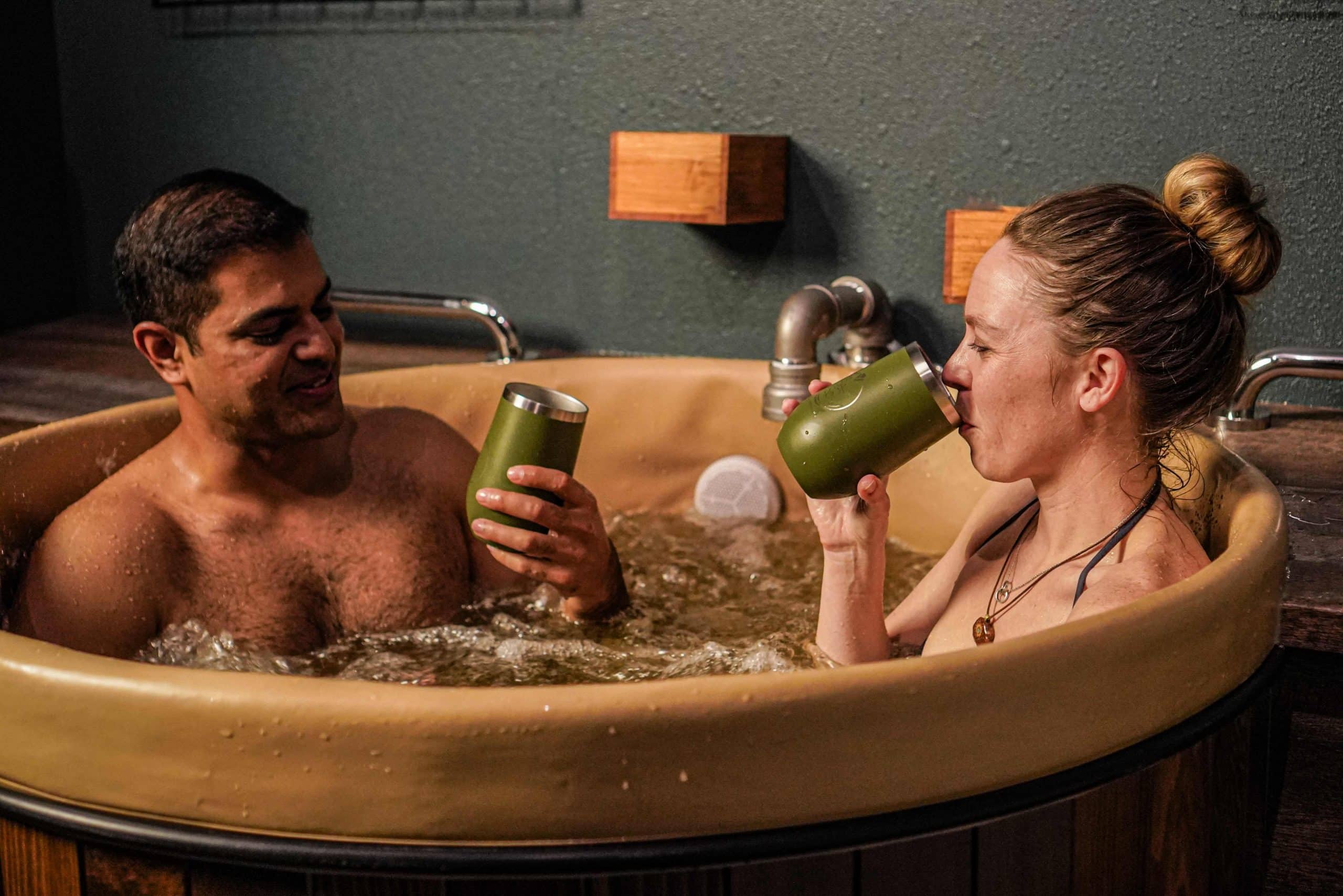With a rise in wellness practices over the years, there’s a lot of information about the benefits of baths. So what are the benefits of bathing in hot water? Is cold water better? We’ll answer these questions below.
Continue reading to learn more about how soaking in water affects your health, plus fun ways to take your baths up a notch.
What are the benefits of bathing in hot water?
From stress relief to more radiant skin, taking a bath in warm water can be great for the body.
To reap the benefits and not see adverse effects, make sure your bath water isn’t too hot. The ideal temperature is around 100 °F, where it’s not too hot to comfortably touch.
Here’s a quick list of how warm baths can benefit you:
- Alleviates muscle aches and pains
- Reduces headaches
- Improves flexibility
- Relieves stress and anxiety
- Encourages good sleep
- Supports heart health
- Enhances skin
- Balances hormones
- Boosts the immune system
- Promotes self-care
1. Alleviates body aches and pains
Whether you feel stiff from your job, are recovering from an injury, or struggle with arthritis, soaking in a warm bath can make a significant difference.
Hot water helps get your blood flowing, reduces inflammation, and relieves joint pain and sore muscles to help you feel and move better.
Fun fact: The Arthritis Foundation highly recommends warm water for relief.
2. Reduces headaches
Do you suffer from the occasional headache or experience migraines? Soaking in a warm bath can help. Because hot baths improve blood circulation and relieve aches and pains, this also addresses headaches.
3. Improves flexibility
When you bathe in warm water, the force of gravity pushing down on your joints releases. This, along with decreased tension and pain, naturally improves your flexibility.
That’s why hot baths are great for gymnasts, dancers, and watersports enthusiasts.
4. Relieves stress and anxiety
It’s no secret that many people struggle with stress and anxiety, whether related to world issues or personal experiences.
And most of us can agree that taking time to decompress in a bath usually feels nice. Science-backed research also shows the positive effects of warm baths on stress and anxiety.
This study worked with about 40 adults to examine the effects of immersing in water vs. taking showers. The results show people who take baths experience lower stress levels and more happiness.

5. Encourages good sleep
Do you struggle to fall asleep, wake up throughout the night, or not feel rested in the morning? More hot baths might be your solution.
Not only does feeling less stressed naturally help with sleep, but a bath before bedtime can calm your mind and body for better rest.
Warm baths also encourage your organs to function well to boost your overall well-being, which is necessary for sleeping well.
6. Supports heart health
One of the most surprising benefits of bathing in hot water is that it can improve or maintain good heart health.
Dr. Adolph Hutter, a cardiologist and professor of medicine at Harvard University, supports that soaking in warm water causes your blood vessels to dilate. This helps lower blood pressure and decrease heart problems.
7. Enhances skin
Relaxing in a warm water bath is an excellent way to open up your pores and remove excess oils, dirt, and bacteria trapped in the skin. Essential oils and other additions to your bath can offer even more benefits.
Tip: Bring a piece of a great day spa into your home. Add a herbal bath tea for added nutrients and antioxidants in your water for nourishment, to fight anti-aging, and to encourage radiant skin.

8. Balances hormones
Various medically reviewed studies discuss how warm baths can positively impact hormones. For example, hot water can decrease stress hormones. It also boosts serotonin, a chemical in various body parts that encourages happiness and overall wellness.
Hormonal balance is necessary for overall health and well-being. Hormones affect just about all aspects of mental and physical health, including blood sugar, metabolism, fertility, and mood.
9. Boosts the immune system
Taking a bath in warm water can boost your immune system in many ways. For example, raising your body temperature is an excellent way to fight off viruses and bacteria.
Reducing stress, getting better sleep, and proper blood flow are also crucial for a healthy immune system.
10. Promotes self-care
Along with all the health benefits of bathing with hot water, it’s also one of the easiest ways to indulge in self-care.
Not only does taking a warm bath simply feel good, but if you make the experience enjoyable, you’ll want to prioritize more time for it.
Make your baths fun, and create a regular habit of it. Here are some ideas for this:
- Schedule “me nights” for listening to music, reading, or resting in the bath.
- Create a bathtime playlist.
- Make yourself a delicious drink before your bath.
Check out these bath accessories for a fancy bathtime routine.
Benefits of Bathing in Hot Water: FAQ
Below, we’ll answer some common questions about taking a bath in warm water.

What happens if we bathe with hot water daily?
While many believe a daily hot bath can dry out your skin, there are ways to avoid this. For example, you can use moisturizing ingredients in your bath or lather with lotion afterward.
Taking baths daily can boost the benefits. That said, if you notice your skin drying out, take a warm water bath no more than 3 or 4 times per week.
You also want to make sure your bath water isn’t too hot. It should be just a few degrees warmer than your body temperature.
Which is better, a hot or cold water bath?
Hot and cold water baths are both beneficial. Mixing it up and taking hot and cold water baths and showers is best.
Warm and cold water both help relieve body aches and pain, improve mental health, and encourage better blood flow.
Warm baths especially help encourage calmness, improve sleep, and promote heart health. On the other hand, cold baths are energizing and help with skin and hair.
Are warm showers suitable too?
Absolutely. Many people don’t like taking baths or don’t have a tub, but warm showers are great too.
While you get more benefits from soaking in warm water, warm showers can also positively impact your physical and mental wellness. Increase your shower time for the most benefits.
Take your warm bath up a notch
The benefits of bathing in hot water are incredible. You can relieve stress and anxiety, reduce body aches and pain, and improve sleep.
You can also add beneficial ingredients if you want to take your warm bath up a notch. Epsom salt and essential oils are common.
Our favorite addition to a warm bath is this uplifting herbal bath tea. It’s an aromatic blend of hops, barley, and eucalyptus, which contains antioxidants and nutrients to enhance relaxation and skin health.
You want to cancel?
You want to reschedule?
joining our waitlist.
This can happen if you accidentally click the Submit button more than once.
Please, "Proceed creating new appointment" if you actually do need to make one more booking or "Discard" if you see the same booking in the list below.

















